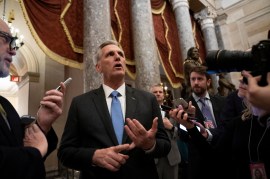By Sarah A. Binder
Representative Kevin McCarthy (R-Calif.)’s rocky road to the House Speakership came at a steep price. After 15 ballots, the most since the Civil War, McCarthy narrowly sewed up support only after agreeing to most of the procedural and policy demands of 20-some-odd members of the far-right bloc of House Republicans, the Freedom Caucus.
Disputes over the rules often reflect a party’s ideological rifts. But intense fighting over the rules this time was actually a fight over the House Republicans’ agenda and who will control it in the new Congress. On that score, members of the far-right, anti-establishment Freedom Caucus won big.
Here’s what you need to know about the road ahead.
Brawls over House rules are old hat
Unlike the Senate, whose rules carry over one Congress to the next, each House adopts its rules anew at the start of each two-year Congress on the heels of electing its Speaker. When the chamber adopts its new rules, members of the majority party are often on the same page and just tinker with the previous session’s rules. But not always.
Previous contested speakership elections often hinged on fights over the rules. A century ago, the last time it took more than a single ballot to choose the speaker, Progressive Republicans broke from the party’s conservative wing to block election of the party nominee. They wanted to adopt new rules that strengthen the procedural rights of rank-and-file lawmakers and weaken leaders’ control. They won some concessions, but to Progressives’ dismay, Republicans expanded their ranks after the next election and clawed back those rules.
Since then, procedural battles when electing a Speaker have taken place off the House floor. When a faction of swing district Democrats opposed returning Representative Nancy Pelosi (D-Calif.) to the Speakership in 2019, she bought off dissenters with minor procedural concessions before balloting began.
Demands from a far-right faction
Unlike past factions that often occupied the political center, making common cause with minority party lawmakers, far-right Freedom Caucus members generally hail from safe red seats and often vote against large bipartisan deals. Some of them spearheaded efforts to keep former President Trump in office after he lost the 2020 election, and almost all of the returning members voted in the wake of the January 6 attack on the Capitol to overturn the results of the presidential election.
Many Freedom Caucus members demanded that Republican leaders loosen the procedural reins. That’s because in recent decades, House majorities have centralized authority over the agenda in leaders’ hands. So long as majority party leaders maintain the support of their rank and file, leaders call the shots on which bills advance to the floor and block votes on politically charged amendments.
Some say McCarthy’s opponents wanted to “democratize” the rules, for example demanding that GOP leaders restore amendment free-for-alls on the House floor. Both parties’ leaders have steered clear of so-called “open rules” in recent years to avoid controversial votes. (In fact, Republicans’ last dust up over amendments occurred in 2015 when conservatives wanted to allow the Confederate flag to fly over federal cemeteries.) More likely, Freedom Caucus members want open rules to advance their own policy and political agendas and force lawmakers to take votes on Caucus priorities.
Costly rules changes
McCarthy’s opponents secured numerous procedural concessions that could advance their agenda of significantly paring back federal spending, especially on the social safety net. The new rules require a two-thirds majority to raise taxes, mandate new spending (but not tax cuts) to be paid for, and permits amendments to fire or reduce the pay of federal officials.
The House also created an investigatory panel to probe what Republicans term the Biden administration’s “weaponization of government.” A late concession to the holdouts explicitly empowers the committee to review “ongoing criminal investigations.” Those would presumably include the Justice Department’s criminal investigations into 2020 election interference and likely even the involvement of some Freedom Caucus members.
Sharing reins of power
Beyond rules changes, McCarthy promised to put Freedom Caucus members in coveted seats on the party panel that doles out committee assignments and gavels. Caucus members also nabbed three seats on the House Rules Committee, the arm of the leadership that sets the floor agenda. Leaders typically stack the committee with nine of their most loyal members, leaving the minority party four seats. Freedom Caucus reps can now threaten to join forces with Democrats if Republicans won’t accommodate their demands.
McCarthy also apparently promised a vote on a ten-year balanced budget plan that would reduce federal spending and would require trillions in cuts to achieve. Defense hawks are unlikely to support cuts in military spending, and swing district GOP members could join Democrats to oppose excessive cuts to domestic programs. McCarthy also committed to pair a vote to increase the government debt limit with steep spending cuts. President Biden and the Senate are unlikely to accept that deal, raising the chances of an unthinkable government default later this year.
If McCarthy reneges, any of his opponents could exploit a newly restored “motion to vacate” that allows a single member to call a snap vote to remove him as Speaker.
Rocky road ahead
Any Republican speaker would face the daunting task of building winning coalitions when the margin for error is so small and the conference divided. McCarthy’s challenge is steeper.
Concessions to the GOP’s extreme tail weaken McCarthy as Speaker. Needing their votes to become Speaker, McCarthy does not appear to have demanded anything from the Freedom Caucus in return for sharing the procedural reins. Freedom Caucus members have typically lobbed bombs from the sidelines and voted against Republicans when their amendments failed. Will they stick with the party this time when they don’t get their way? That’s a core expectation for lawmakers who benefit from leaders’ largesse. Emerging fractures within the Freedom Caucus won’t make things any easier.


